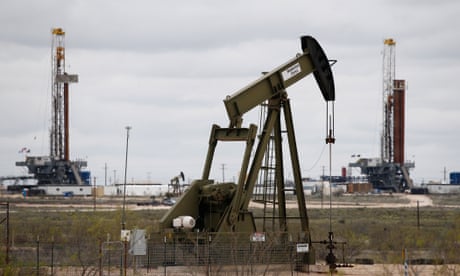- by foxnews
- 04 Jun 2025
Public lands to reopen for oil and gas drilling in a first under Biden
Public lands to reopen for oil and gas drilling in a first under Biden
- by theguardian
- 17 Apr 2022
- in news

As federal officials weigh efforts to fight the climate crisis against pressure to bring down high gasoline prices, the interior department is moving forward with the first onshore sales of public oil and natural gas drilling leases under Joe Biden.
The move also calls for a sharp increase in royalty rates for companies, ostensibly to limit global emissions driving the climate crisis, though economists say the effect will be relatively small.
The government held an offshore lease auction in the Gulf of Mexico in November, although a court later blocked that sale before the leases were issued.
Yet Biden also faces calls from within his own party to do more to curb emissions from fossil fuels that are driving the climate crisis.
Leases for 225 sq miles (580 sq kilometers) of federal lands primarily in the western US will be offered for sale in a notice to be posted on Monday, officials said. The parcels represent about 30% less land than officials had proposed for sale in November and 80% less than what was originally nominated by the industry.
The sales notices will cover leasing decisions in nine states: Wyoming, Colorado, Utah, New Mexico, Montana, Alabama, Nevada, North Dakota and Oklahoma.
Hundreds of parcels of public land that companies nominated for leasing had been previously dropped from the upcoming lease sale because of concerns about wildlife being harmed by drilling rigs.
At the time, officials said burning fuel from the remaining leases could cost billions of dollars in climate crisis impacts. Fossil fuels extracted from public lands account for about 20% of energy-related US greenhouse gas emissions, making them a prime target for climate activists who want to shut down leasing.
Republicans want more drilling, saying it would increase US energy independence and help bring down the cost of crude. But oil companies have been hesitant to expand drilling because of uncertainty over how long high prices will continue.
But the move brought condemnation from both ends of the political spectrum: Environmentalists derided the decision to hold the long-delayed sales, while oil industry representatives said the higher royalty rates would deter drilling.
Lease sales and royalties that companies pay on extracted oil and gas brought in more than $83bn in revenue over the past decade. Half the money from onshore drilling goes to the state where it occurred.
Most states and many private landowners require companies to pay royalty rates higher than 12.5%, with some states charging 20% or more, according to federal officials.
The royalty rate for oil produced from federal reserves in deep waters in the Gulf of Mexico is 18.75%. In the November auction that was later canceled, energy companies including Shell, BP, Chevron and ExxonMobil offered a combined $192m for offshore drilling rights in the Gulf.
New leases that are developed could keep producing crude long past 2030, when Biden has set a goal to lower greenhouse gas emissions by at least 50%, compared with 2005 levels. Scientists say the world needs to be well on the way to that goal over the next decade to avoid catastrophic climate crisis.
Economists say a higher royalty rate would have a relatively small effect on global emissions, because any reductions in oil and gas from federal lands would be largely offset by fuel from other sources.
- by foxnews
- descember 09, 2016
Should you lock your luggage when traveling? Why it's a weighty matter
With tightened security, experts are warning of luggage risks like theft and mishandling for travelers. TSA sees 90,000 to 100,000 items left at checkpoints monthly.
read more


